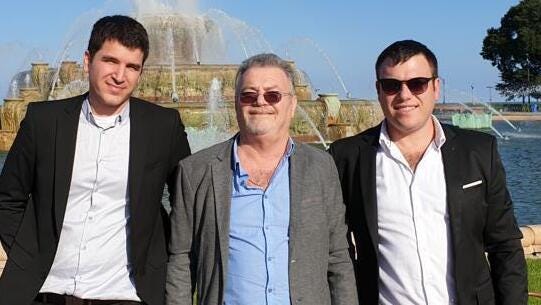Tel Aviv Diary June 16, 2023
Netanyahu Loses Control, Military Service Terms Changed,New Military Tech Developed, Problems in Education,History and a Review
NETANYAHU LOSES CONTROL OF HIS COALITION
Explaining the tumultuous political events of the past 48 hours is a challenge. In accordance with the rules of the Knesset, Judicial Selection Committee members had to be voted in this past Wednesday. The makeup of the Selection Committee has been one of the central areas of contention in the government’s attempt to change the Judiciary substantially. Pursuant to the original proposal raised by Justice Minister Levin, the Judicial Selection Committee would be controlled by the government, thus ensuring only judges they endorsed would be approved. Furthermore, the coalition wanted to change the way the Chief Justices are selected (to date, the Chief Justice is by appointed by seniority), transferring control over who would be appointed the Chief Justice to the government. Under the guidance of President Herzog, an agreement was forged to maintain the momentum of talks to reach a compromise. This Presidential agreement stipulated that the Knesset would convene and elect one member from the coalition and one member from the opposition to serve on the Judicial Selection Committee.
.
Initially, Netanyahu was agreeable to this plan. However, by Wednesday morning, it became evident that his MKs would not comply, refusing to vote in favor of the opposition’s representative, Karine Elharrar. Netanyahu then faced the task of persuading all of those running to serve as the coalition’s committee representative to withdraw, leaving only one representative (from the opposition). This would have effectively delayed the decision by a month. However, a junior Knesset member, Tali Gottlieb, known for her extreme, generally combative views, rejected this plan and refused to step down.
As a result, Netanyahu and other coalition leaders ordered all of their members to vote 'no' for all candidates, thereby, postponing the decision. However, the vote was convened by secret ballot, and after three recounts, it was revealed that (with the assistance of 4 votes from coalition members, against the coalition’s stated directive), Elharrar from the opposition’s Yesh Atid party had been elected to the Judicial Selection Committee, while Gottlieb had not.
The opposition leaders subsequently declared that discussions at the President's Residence would be suspended until the Judicial Selection Committee was convened, in the configuration they had been promised. One member from the coalition, one from the opposition and the rest being current Supreme Court Judges and Representative of the Bar Association with the chairman of the committee being the Justice Minister.
The path forward remains uncertain. While some members of the coalition are advocating for unilateral passage of their full package of proposed judicial changes Netanyahu opposes this outcome. Amidst the severe confusion, what is evident is that Netanyahu's position has been further undermined by the events that took place this week. Polling data suggest that if the next election was held today, the current government would only secure between 50—54 seats.
MILITARY— TRAGEDY ON THE EGYPTIAN BORDER
The IDF released its report on the tragedy that transpired last week on our Egyptian border, which led to the death of three IDF soldiers. As a result of the report, the Brigade Commander has been relieved of his command, while the Unit Commander received a letter of censure, and will be ineligible to advance for five years. The investigation determined that the terrorist crossed into Israeli territory through a secret door in the border fence known only to the Brigade and Battalion commanders, along with some small number of specialized scouts. The soldiers on the line had no idea the secret door existed. The two killed at the guard post were ambushed while fully awake and armed, but were caught completely by surprise. The third soldier who was killed while in pursuit of the terrorist was not wearing his body armor. The report further stated that the soldiers who manned a nearby guard post heard the gunfire, but did not report it. There are still many unanswered questions about the Egyptian soldier turned terrorist, and Israel is trying to get those answers from the Egyptians.
MILITARY— ATTACK ON SYRIA
According to reports from Syria, Israel attacked storage facilities of pro-Iranian militias in Syria on Tuesday night.
MILITARY— MANDATORY SERVICE TERMS & WAGE INCREASE
The mandatory military service period for men in Israel will be reduced to 24 months, starting July 2026 (no change for women's service period). Draftees from July 2024 will be discharged in July 2026. However, this reduction in service time is at the military's discretion; soldiers in certain units may need to serve up to 32 months, with the average male soldier serving 28 months. Most combat soldiers and those in professions which require long training and experience accumulation will likely serve 32 months
.
Soldiers’ wages will be increased by 25% next year, and another 25% in 2025, after two years of service. Meaning, the salary will increase for all soldiers from the 25th month of service onwards. In the next two years, this means all male soldiers, currently serving 32 months, and also women serving more than two years, will benefit from this salary increase in their last months of their service.
With the service reduction scheduled to take effect in July 2026, only soldiers required to serve 28-32 months will get significant salary increases for each additional month (from the 25th month onward). Increases will total approximately 2,000 NIS/per month for non-combat soldiers (which will be few); about 2,500 NIS/per month for combat support soldiers; and about 3,000 NIS/per month for combat soldiers from the 25th-28th month, with 3,500 NIS/per month from the 29th-32nd month. The salary for a combat soldier will reach about 6,800 shekels per month by the end of their service in 2026.
GERMAN DEFENSE PURCHASE
The German Parliament has given its approval for the purchase of the Arrow-3 Missile Defense System from Israel. Priced at 4.2 billion Euros. This transaction marks the largest-ever defense sale made by Israel. This system, designed to intercept incoming medium-range ballistic missiles, will equip Germany with a layer of protection against potential Russian nuclear attack.
There's a certain historical irony in this situation. Germany, once governed by the Nazis who sought to annihilate the Jewish population, will now secure its defense from potential Russian threats by employing a missile system developed and produced by the State of Israel, the homeland of the Jews.
EDUCATION
A disconcerting report was issued this week by the Shoresh Institution, authored by Ariela Savin, Ayal Kimhi, and Dan Ben-David. Based on the PISA exam scores from 2006-2018, the report reveals a deeply worrisome issue regarding Israel's education system. The report not only emphasized the lackluster performance of Israeli students who took the exam — ranking 36th out of 51 participating nations — but also drew attention to an even more distressing correlation: the domestic achievement gap in Israel was the largest of all participating countries across all 15 exams over the entire period (2006-2018), significantly outpacing the country with the second largest performance imbalance, Bulgaria.
The discrepancy in achievement was particularly stark between Hebrew-speaking and Arabic-speaking students in Israel. If Haredi students, who constitute an annually increasing share of the population, had also participated in the PISA exams (which they do not), the domestic achievement gap in Israel would likely have been even wider.
What's particularly alarming is the fact that Israel was the least successful country in closing the educational gap between generations. Israeli students with at least one parent who completed high school scored an average of 9% higher than Israeli students whose parents did not complete high school. This gap is almost twice the 5% gap seen in top-performing countries. When one parent holds an academic degree, the disparity between the performance of their children and those whose parents did not complete high school increases to 8% in the leading countries. In contrast, the gap in Israel is 50% higher, at 12%.
The widest achievement gaps in the leading countries, as well as in Israel, are seen between children with two academically degreed parents and children with two parents who did not complete high school. The gap among such groups in Israel (15%) is two-thirds larger than the gap in the top-performing countries (9%).
ECONOMY
The inflation rate in Israel surprised analysts who were expecting inflation for the month of May to be .5-.6% — instead May’s rate of inflation turned out to be only .2%. The annual inflation rate is now 4.6%. The slowdown on inflation was caused primarily by a drop in clothing and food prices. The lower than expected inflation results will most likely allow the Bank of Israel to pause its interest increases, which have severely impacted Israeli borrowers — especially mortgage holders who have variable-interest mortgages.
BUSINESS
The Israeli cybersecurity startup “Kodem”, founded in June 2021, and has been operating under the media radar, in so-called “stealth mode”. Kodem has recently unveiled itself after having raised $25 million from Greylock and TPY Capital. The unveiling comes at a time when Kodem, which currently employs 30 people, aims to increase their workforce and expand sales in the US.
This week, Elbit Systems Ltd. was awarded an additional contract by Airbus Helicopters for the Federal Office for Bundeswehr Equipment, Information Technology and In-Service Support, for the provision of Airborne Electronic Warfare (EW) self-protection systems for the CH‑53 GS/GE transport helicopters, as part of the platform upgrade program led by Airbus Helicopters.
Under the contract, Elbit Systems, supported by Elbit Systems Deutschland, will provide digital Radar Warning Receivers (RWR), EW Controllers (EWC) and Counter Measure Dispensing Systems (CMDS). The digital RWR and EWC rapidly detect and accurately locate a wide range of threats, even in a dense EW environment, enabling reliable and timely warning and effective protection. The systems feature complete and independent threat programmability, enabling seamless update of emitter libraries as well as flight data recording for pilot debriefing and training. Coupled with the CMDS the entire system provides the German Air Force with a high level of operational effectiveness.
Elbit also announced a new product: Nano SPEAR- an advanced, digital and miniature system designed as a countermeasure against radar-guided air-to-air and surface-to-air missiles that threaten aircrews and their platforms and a new RWR Electronic Warfare (EW) capability as part of its Unified EW suite that enables drone detection and identification as well as locating Personal Location Beacon (PLB) of ground forces and pilots.
Rafael announced this week that for the last three years it has been developing the skySonic anti-missile system designed to meet the threat posed by hypersonic missiles. The system also includes elements that will allow the intercepter to track and destroy highly maneuverable missiles that other systems might have trouble downing.
American equipment giant, Ingersoll Rand, is set to acquire the Israeli firm, Ecoplant, renowned for its technology aimed at reducing air pollution in factories. The transaction, speculated to be between $40-$50 million, showcases a 6-7 fold return on the $8.5 million raised by Ecoplant. The firm's investor roster includes: Ecolab, Techstars, BGV VC, the Century Club, and Kibbutz Gabim. Additionally, the company has received $3 million in grants from the Innovation Authority and the BIRD Foundation. As a result of the acquisition, Ingersoll-Rand plans to establish a center in Israel, employing up to 100 employees by the end of 2024.
The start-up company, Percepto, which develops technologies for autonomous drones, has raised $67 million in a Series-C funding round led by Koch Disruptive Technologies (KDT). This round brings the company's total funding since its inception to over $120 million. About $50 million of this round was raised in equity, with the rest in debt provided by the credit fund, Kraus Capital, which was sold to BlackRock. This funding round comes after the company underwent two rounds of layoffs, during which it terminated 25% of its workforce. Percepto develops autonomous drones that perform automated monitoring of industrial sites, including power plants, mines, chemical factories, and refineries, aiming to identify safety and maintenance issues in the site infrastructure.
A PIECE OF HISTORY— MASS IMMIGRATION
Beyond combating the war, the government's foremost objective was to enable all Jews in displaced persons camps in Europe to migrate to Israel, and migrate they did. Between September 1948 and August 1949, fifty-two refugee centers across Europe were shut down as their Jewish inhabitants moved to Israel. Moreover, a substantial portion of Bulgarian and Turkish Jews also relocated during this period. Additionally, the Communist regimes in Poland and Romania permitted Jews residing there to emigrate to Israel.
Between May 15, 1948, and June 30, 1953, Israel's Jewish population doubled. In the state's initial 18 months, 340,000 Jews arrived. This unparalleled influx forced Israel to improvise to provide food and shelter to all newcomers.
The abandoned Arab homes, vacated by Arabs fleeing the country, were the initial solution for housing, but they quickly filled up. Although new homes were being built, the pace of even the most basic home construction couldn't keep up with the housing demand. Tent cities first emerged around Haifa, the port of entry for all immigrants, but it was soon decided to disperse the population more broadly across the country. By 1951 there were 53 camps containing 51,000 tents, housing 97,000 people. The Jewish Agency provided food through a central kitchen. The main issue with these camps was the lack of employment, making residents dependent on government support. Thus, transit camps were planned outside larger cities where work was available. The first ones sprouted on the outskirts of Tel Aviv, proving relatively successful, with each family given a basic stove for cooking and many immigrants finding temporary work.
By November 1951, 127 temporary housing sites, or Ma’abarot as they were known in Hebrew, were providing temporary homes for 223,000 people. Initially, residents expected to stay for just two or three months. In reality, the average stay in a Ma’abarot extended to two years.
Life in the Ma’abarot was particularly challenging during the harsh and rainy winters of 1951 and 1952. The Ma’abarot began to be dismantled in 1953, with many people transitioning to permanent housing. By the end of 1954, the Ma’abarot housed only 90,000 people. Some of the Ma’abarot transformed into new towns, including Sderot, Kiryat Malachi, Yerucham, Bet Shemesh, and Kiryat Shmonah. Others morphed into neighborhoods in existing cities like Kefar Necham in Raanana and Pardes Katz in B’nei Brak. Although the majority of residents left the Ma’abarot, it wasn't until the latter half of the 1970s that the final buildings in the Ma’abarot were replaced and the last residents departed. From a practical perspective, the Ma’abarot served a crucial transitional purpose for a state struggling to construct housing quickly enough. However, they also became a cultural symbol of a population that felt overlooked.
A TASTE OF TEL AVIV— ONAUMA
RESTAURANT REVIEW, by Tali Schulman
Until recently, Thai House was the only place to go for truly satisfying and authentic Thai cuisine in the city. Although their food was delicious, Thai House was known for being quite expensive and nearly impossible to secure a last-minute table. This didn't align with my typical expectations for Thai cuisine as often reliable options for those indecisive "I don't know what I want to eat" moments. Therefore, it has been truly delightful to witness a surge of casual and authentic Thai eateries emerging throughout the city. Among this collection, my personal favorite is Onauma, located on Carlebach Street, just across from TLV Fashion Mall. Onauma offers all the classic staples one would expect from a Thai restaurant, without any unnecessary frills or overly unique twists. They simply do it right. Because the space is small, reservations are recommended, but, you can almost always find a seat at the bar, or opt for takeout. If you’re craving your go to Thai dish, Onauma is the place to go
!
For more Tel Aviv restaurant recommendations, you can find me on Instagram @talischulman where I save all my food adventures in my highlights!











